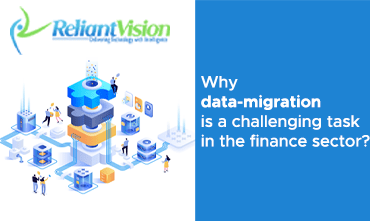Data migration simply put, is transferring the data from one server to another. It can be an on-premise server or a cloud server. However, it is difficult for implementation, as said, particularly for the finance sector. The finance sector holds large amounts of sensitive financial information and, because of this, it is the most scrutinized sector for data migration. Legacy companies with legacy data stay back in their comfort zones, working within the confines of an existing framework, without realizing what they are losing by doing so. While what is at stake if you do not migrate is another topic for discussion, we bring you a few insights into what challenges data migration entails and how to find the solutions.
SecurityPutting sensitive data into the hands of a third party is dangerous, which is a misplaced fear. According to a report published in NYT, data stored at the on-premise server is more vulnerable to security breaches. Your data may be available for public consumption via various posts of which you may not be aware. While on-premise setups can also keep data secure with high efficiency from the beginning, cloud systems learn your networks with time and become secure than on-premise security. In terms of susceptibility, cloud-based data is less vulnerable because data centers have strengthened walls and advanced security features. Because of these security features, cloud services have gained popularity. Security is their priority and not a complimentary service. The one thing you need to make sure of is to have reliable partners.
ComplianceThe finance sector is the most regulated sector, which demands utmost security. The entire work goes waste if the project doesn’t comply with the regulation standards. Regulated under IT Act, GOI has stipulated stringent measures in cases of data violation. Prima facie data migration doesn’t appear to have the potential to invite compliance issues. But many unwanted issues can penalize the companies for improper implementation. For example, data migration, which is not just about the transfer of data but also about changes in algorithms, can result in altogether different data if not implemented accurately.
Compliance in the cloud is the responsibility of both parties. While it is your responsibility to choose a professional cloud service provider and consider encryption, authentication controls, and backup solutions, the vendor should make you understand the standards and protocols clearly.
AdaptationDespite the cloud’s popularity and efficiency in managing big data, the CFOs and COOs of companies still struggle to grasp the nuances of the cloud and its mechanism. It is not something they do not want to adapt to, but given the challenges such as data security, privacy, financial implications, and ROI, it is fair on their part to be skeptical. With the growing application of cloud technologies in finance with tools like ERP and ERM, it has become easy to scale the IT according to the need of the business. Therefore, it is high time the CFOs adapt themselves to these emerging technologies. It is a necessary evil, CFOs should adapt quickly to understand how they can leverage it to their strategic advantage.
Lack of understanding in legacy systems Other challengesIncomplete documentation, poorly defined data correlations, lack of awareness about data quality issues, ignoring to implement proper data reconciliation process, are few among other data-related challenges that a vendor or a data provider should address.
SolutionsTo seek solutions, the companies need to ask the right questions
What can we do to get ahead of the general adoption challenges?
Which behavioral changes are necessary for a smooth transition and functioning?
What changes do we need to make on the IT and administrative front to keep the data safe?
a) Maintaining data integrity should be the top priority in the finance sector to achieve data security and privacy. In highly regulated fields, data inconsistency can cause serious consequences. Using appropriate file transfer tools, you can attain data integrity to a large extent.
b) Not all data migration plans are the same. So is the implementation strategy. Unless the companies have a plan for data migration, service providers can’t choose the right tools and applications for optimum results.
c) Last but not least, take experienced cloud service providers on board who can address all your organizational needs for cloud migration. Unlike before, data migration is not simple, as it involves a complex system of hybrid technologies.
Realty Vision Group is the right partner for your data migration plans, taking care of it right from the planning strategy to development. The migration process cannot be more seamless and safe when our expertise is at work.

